Criminal Law Report: Data Protection Act, E-crime, Computer Misuse
VerifiedAdded on 2022/08/25
|9
|1639
|16
Report
AI Summary
This report delves into several key areas of criminal law in the UK. It begins with an overview of the Data Protection Act (DPA) of 1998, comparing it with the General Data Protection Regulation (GDPR), highlighting differences in registration, notification, and the scope of data processing. The report then examines the Freedom of Information Act 2000, detailing its provisions for public access to information held by public authorities and the process for making information requests. Furthermore, the report discusses e-crime or cyber-crime and its relation to traditional crimes. Finally, the Computer Misuse Act 1990 is analyzed, focusing on its role in protecting personal data and addressing unauthorized access and modification of computer systems. The report includes references to relevant legal cases and academic sources to support its analysis.
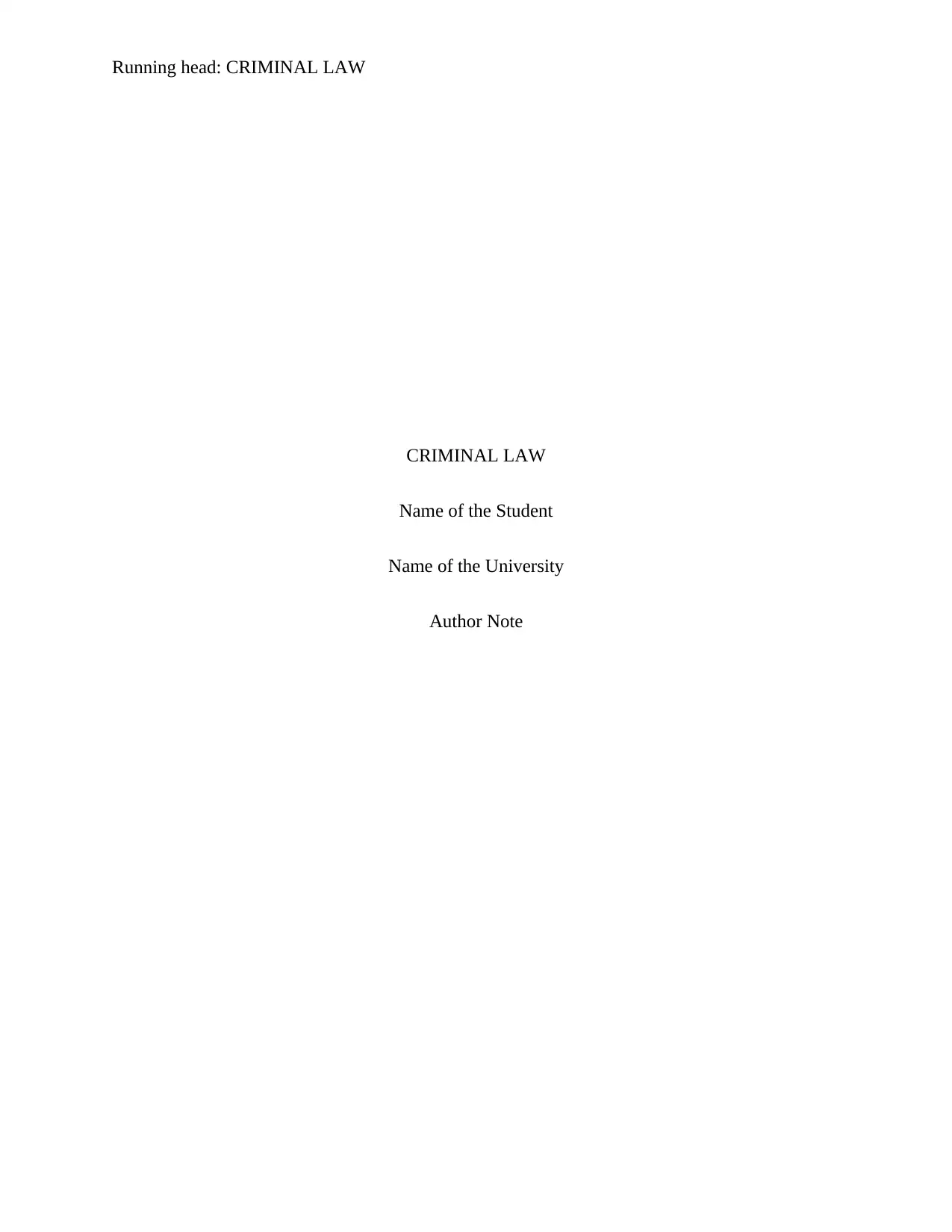
Running head: CRIMINAL LAW
CRIMINAL LAW
Name of the Student
Name of the University
Author Note
CRIMINAL LAW
Name of the Student
Name of the University
Author Note
Paraphrase This Document
Need a fresh take? Get an instant paraphrase of this document with our AI Paraphraser
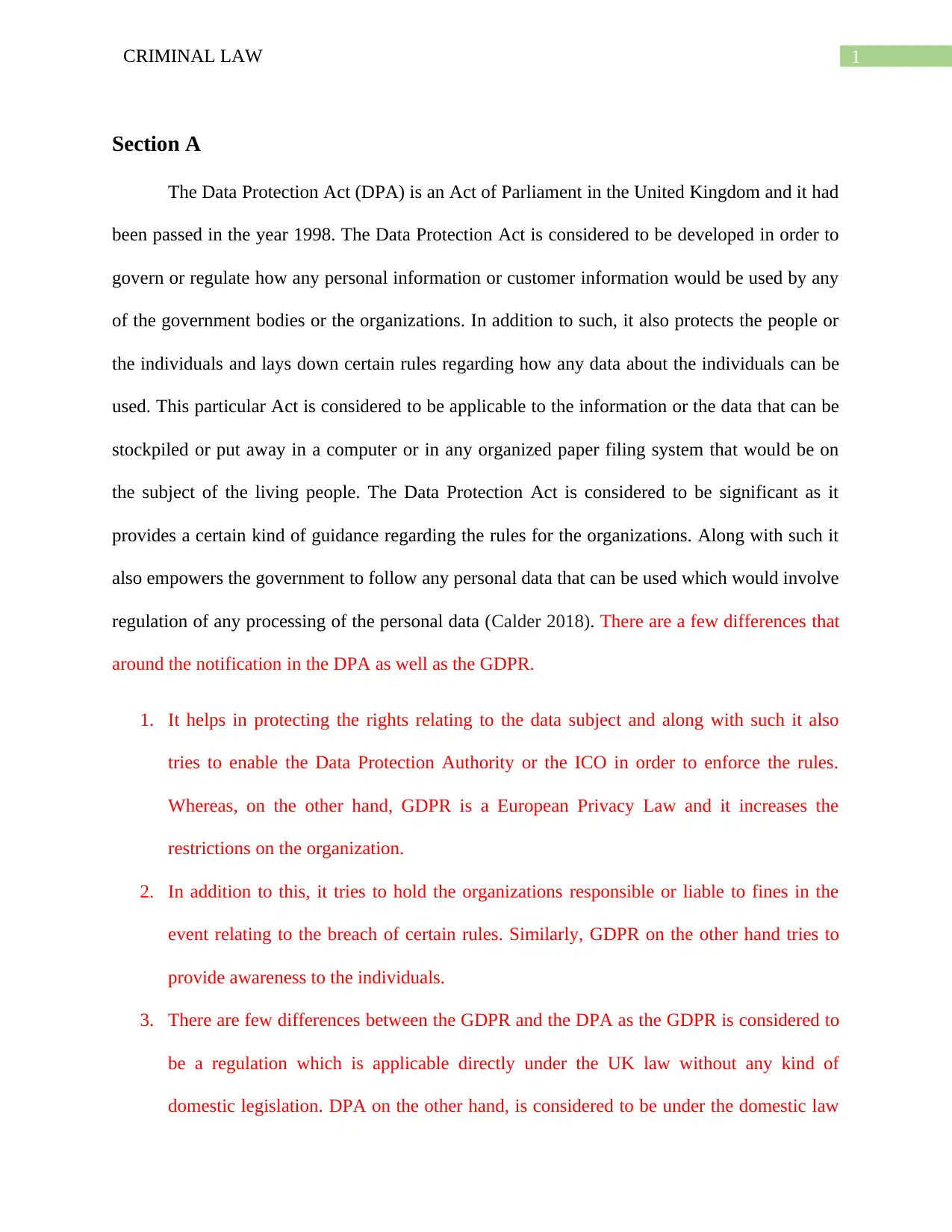
1CRIMINAL LAW
Section A
The Data Protection Act (DPA) is an Act of Parliament in the United Kingdom and it had
been passed in the year 1998. The Data Protection Act is considered to be developed in order to
govern or regulate how any personal information or customer information would be used by any
of the government bodies or the organizations. In addition to such, it also protects the people or
the individuals and lays down certain rules regarding how any data about the individuals can be
used. This particular Act is considered to be applicable to the information or the data that can be
stockpiled or put away in a computer or in any organized paper filing system that would be on
the subject of the living people. The Data Protection Act is considered to be significant as it
provides a certain kind of guidance regarding the rules for the organizations. Along with such it
also empowers the government to follow any personal data that can be used which would involve
regulation of any processing of the personal data (Calder 2018). There are a few differences that
around the notification in the DPA as well as the GDPR.
1. It helps in protecting the rights relating to the data subject and along with such it also
tries to enable the Data Protection Authority or the ICO in order to enforce the rules.
Whereas, on the other hand, GDPR is a European Privacy Law and it increases the
restrictions on the organization.
2. In addition to this, it tries to hold the organizations responsible or liable to fines in the
event relating to the breach of certain rules. Similarly, GDPR on the other hand tries to
provide awareness to the individuals.
3. There are few differences between the GDPR and the DPA as the GDPR is considered to
be a regulation which is applicable directly under the UK law without any kind of
domestic legislation. DPA on the other hand, is considered to be under the domestic law
Section A
The Data Protection Act (DPA) is an Act of Parliament in the United Kingdom and it had
been passed in the year 1998. The Data Protection Act is considered to be developed in order to
govern or regulate how any personal information or customer information would be used by any
of the government bodies or the organizations. In addition to such, it also protects the people or
the individuals and lays down certain rules regarding how any data about the individuals can be
used. This particular Act is considered to be applicable to the information or the data that can be
stockpiled or put away in a computer or in any organized paper filing system that would be on
the subject of the living people. The Data Protection Act is considered to be significant as it
provides a certain kind of guidance regarding the rules for the organizations. Along with such it
also empowers the government to follow any personal data that can be used which would involve
regulation of any processing of the personal data (Calder 2018). There are a few differences that
around the notification in the DPA as well as the GDPR.
1. It helps in protecting the rights relating to the data subject and along with such it also
tries to enable the Data Protection Authority or the ICO in order to enforce the rules.
Whereas, on the other hand, GDPR is a European Privacy Law and it increases the
restrictions on the organization.
2. In addition to this, it tries to hold the organizations responsible or liable to fines in the
event relating to the breach of certain rules. Similarly, GDPR on the other hand tries to
provide awareness to the individuals.
3. There are few differences between the GDPR and the DPA as the GDPR is considered to
be a regulation which is applicable directly under the UK law without any kind of
domestic legislation. DPA on the other hand, is considered to be under the domestic law
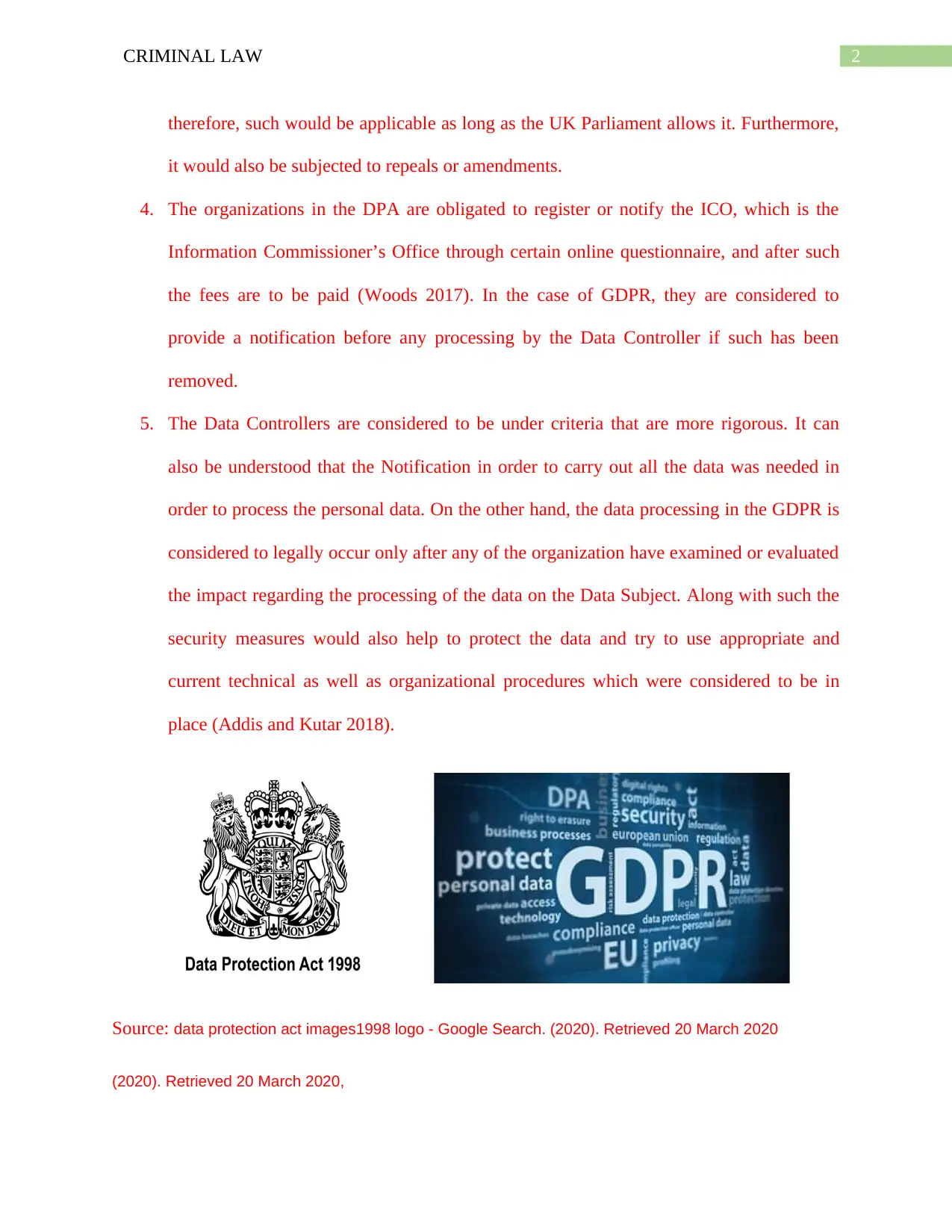
2CRIMINAL LAW
therefore, such would be applicable as long as the UK Parliament allows it. Furthermore,
it would also be subjected to repeals or amendments.
4. The organizations in the DPA are obligated to register or notify the ICO, which is the
Information Commissioner’s Office through certain online questionnaire, and after such
the fees are to be paid (Woods 2017). In the case of GDPR, they are considered to
provide a notification before any processing by the Data Controller if such has been
removed.
5. The Data Controllers are considered to be under criteria that are more rigorous. It can
also be understood that the Notification in order to carry out all the data was needed in
order to process the personal data. On the other hand, the data processing in the GDPR is
considered to legally occur only after any of the organization have examined or evaluated
the impact regarding the processing of the data on the Data Subject. Along with such the
security measures would also help to protect the data and try to use appropriate and
current technical as well as organizational procedures which were considered to be in
place (Addis and Kutar 2018).
Source: data protection act images1998 logo - Google Search. (2020). Retrieved 20 March 2020
(2020). Retrieved 20 March 2020,
therefore, such would be applicable as long as the UK Parliament allows it. Furthermore,
it would also be subjected to repeals or amendments.
4. The organizations in the DPA are obligated to register or notify the ICO, which is the
Information Commissioner’s Office through certain online questionnaire, and after such
the fees are to be paid (Woods 2017). In the case of GDPR, they are considered to
provide a notification before any processing by the Data Controller if such has been
removed.
5. The Data Controllers are considered to be under criteria that are more rigorous. It can
also be understood that the Notification in order to carry out all the data was needed in
order to process the personal data. On the other hand, the data processing in the GDPR is
considered to legally occur only after any of the organization have examined or evaluated
the impact regarding the processing of the data on the Data Subject. Along with such the
security measures would also help to protect the data and try to use appropriate and
current technical as well as organizational procedures which were considered to be in
place (Addis and Kutar 2018).
Source: data protection act images1998 logo - Google Search. (2020). Retrieved 20 March 2020
(2020). Retrieved 20 March 2020,
⊘ This is a preview!⊘
Do you want full access?
Subscribe today to unlock all pages.

Trusted by 1+ million students worldwide
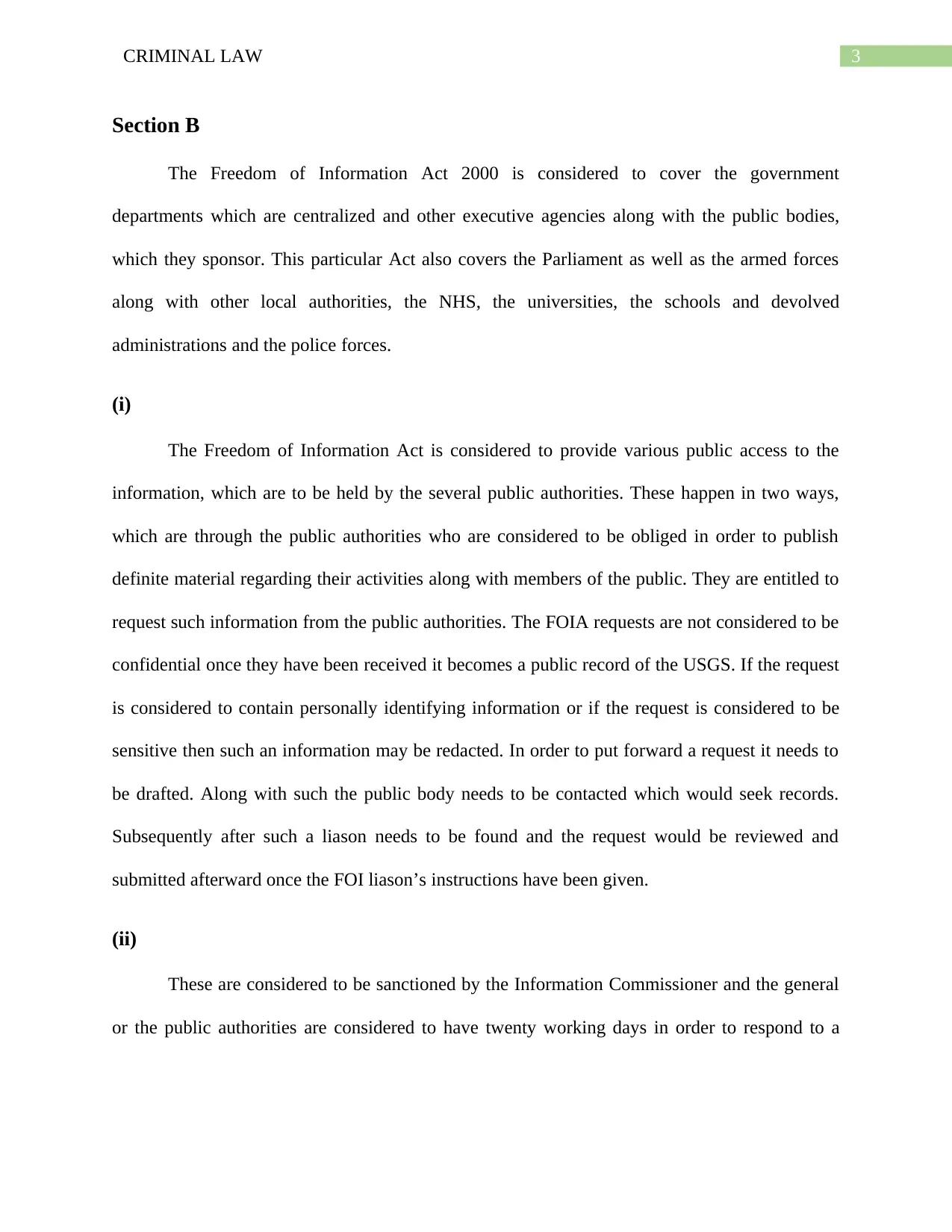
3CRIMINAL LAW
Section B
The Freedom of Information Act 2000 is considered to cover the government
departments which are centralized and other executive agencies along with the public bodies,
which they sponsor. This particular Act also covers the Parliament as well as the armed forces
along with other local authorities, the NHS, the universities, the schools and devolved
administrations and the police forces.
(i)
The Freedom of Information Act is considered to provide various public access to the
information, which are to be held by the several public authorities. These happen in two ways,
which are through the public authorities who are considered to be obliged in order to publish
definite material regarding their activities along with members of the public. They are entitled to
request such information from the public authorities. The FOIA requests are not considered to be
confidential once they have been received it becomes a public record of the USGS. If the request
is considered to contain personally identifying information or if the request is considered to be
sensitive then such an information may be redacted. In order to put forward a request it needs to
be drafted. Along with such the public body needs to be contacted which would seek records.
Subsequently after such a liason needs to be found and the request would be reviewed and
submitted afterward once the FOI liason’s instructions have been given.
(ii)
These are considered to be sanctioned by the Information Commissioner and the general
or the public authorities are considered to have twenty working days in order to respond to a
Section B
The Freedom of Information Act 2000 is considered to cover the government
departments which are centralized and other executive agencies along with the public bodies,
which they sponsor. This particular Act also covers the Parliament as well as the armed forces
along with other local authorities, the NHS, the universities, the schools and devolved
administrations and the police forces.
(i)
The Freedom of Information Act is considered to provide various public access to the
information, which are to be held by the several public authorities. These happen in two ways,
which are through the public authorities who are considered to be obliged in order to publish
definite material regarding their activities along with members of the public. They are entitled to
request such information from the public authorities. The FOIA requests are not considered to be
confidential once they have been received it becomes a public record of the USGS. If the request
is considered to contain personally identifying information or if the request is considered to be
sensitive then such an information may be redacted. In order to put forward a request it needs to
be drafted. Along with such the public body needs to be contacted which would seek records.
Subsequently after such a liason needs to be found and the request would be reviewed and
submitted afterward once the FOI liason’s instructions have been given.
(ii)
These are considered to be sanctioned by the Information Commissioner and the general
or the public authorities are considered to have twenty working days in order to respond to a
Paraphrase This Document
Need a fresh take? Get an instant paraphrase of this document with our AI Paraphraser
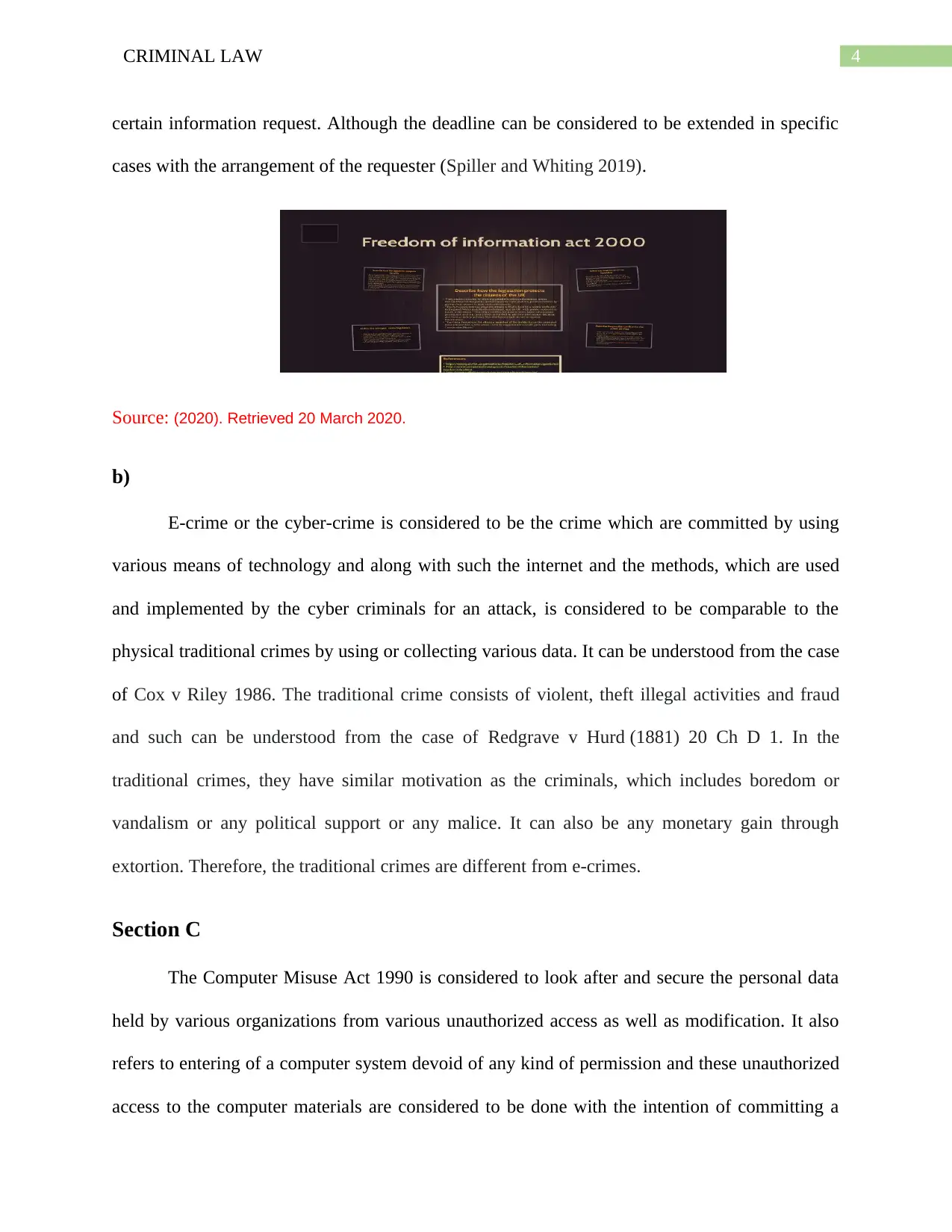
4CRIMINAL LAW
certain information request. Although the deadline can be considered to be extended in specific
cases with the arrangement of the requester (Spiller and Whiting 2019).
Source: (2020). Retrieved 20 March 2020.
b)
E-crime or the cyber-crime is considered to be the crime which are committed by using
various means of technology and along with such the internet and the methods, which are used
and implemented by the cyber criminals for an attack, is considered to be comparable to the
physical traditional crimes by using or collecting various data. It can be understood from the case
of Cox v Riley 1986. The traditional crime consists of violent, theft illegal activities and fraud
and such can be understood from the case of Redgrave v Hurd (1881) 20 Ch D 1. In the
traditional crimes, they have similar motivation as the criminals, which includes boredom or
vandalism or any political support or any malice. It can also be any monetary gain through
extortion. Therefore, the traditional crimes are different from e-crimes.
Section C
The Computer Misuse Act 1990 is considered to look after and secure the personal data
held by various organizations from various unauthorized access as well as modification. It also
refers to entering of a computer system devoid of any kind of permission and these unauthorized
access to the computer materials are considered to be done with the intention of committing a
certain information request. Although the deadline can be considered to be extended in specific
cases with the arrangement of the requester (Spiller and Whiting 2019).
Source: (2020). Retrieved 20 March 2020.
b)
E-crime or the cyber-crime is considered to be the crime which are committed by using
various means of technology and along with such the internet and the methods, which are used
and implemented by the cyber criminals for an attack, is considered to be comparable to the
physical traditional crimes by using or collecting various data. It can be understood from the case
of Cox v Riley 1986. The traditional crime consists of violent, theft illegal activities and fraud
and such can be understood from the case of Redgrave v Hurd (1881) 20 Ch D 1. In the
traditional crimes, they have similar motivation as the criminals, which includes boredom or
vandalism or any political support or any malice. It can also be any monetary gain through
extortion. Therefore, the traditional crimes are different from e-crimes.
Section C
The Computer Misuse Act 1990 is considered to look after and secure the personal data
held by various organizations from various unauthorized access as well as modification. It also
refers to entering of a computer system devoid of any kind of permission and these unauthorized
access to the computer materials are considered to be done with the intention of committing a
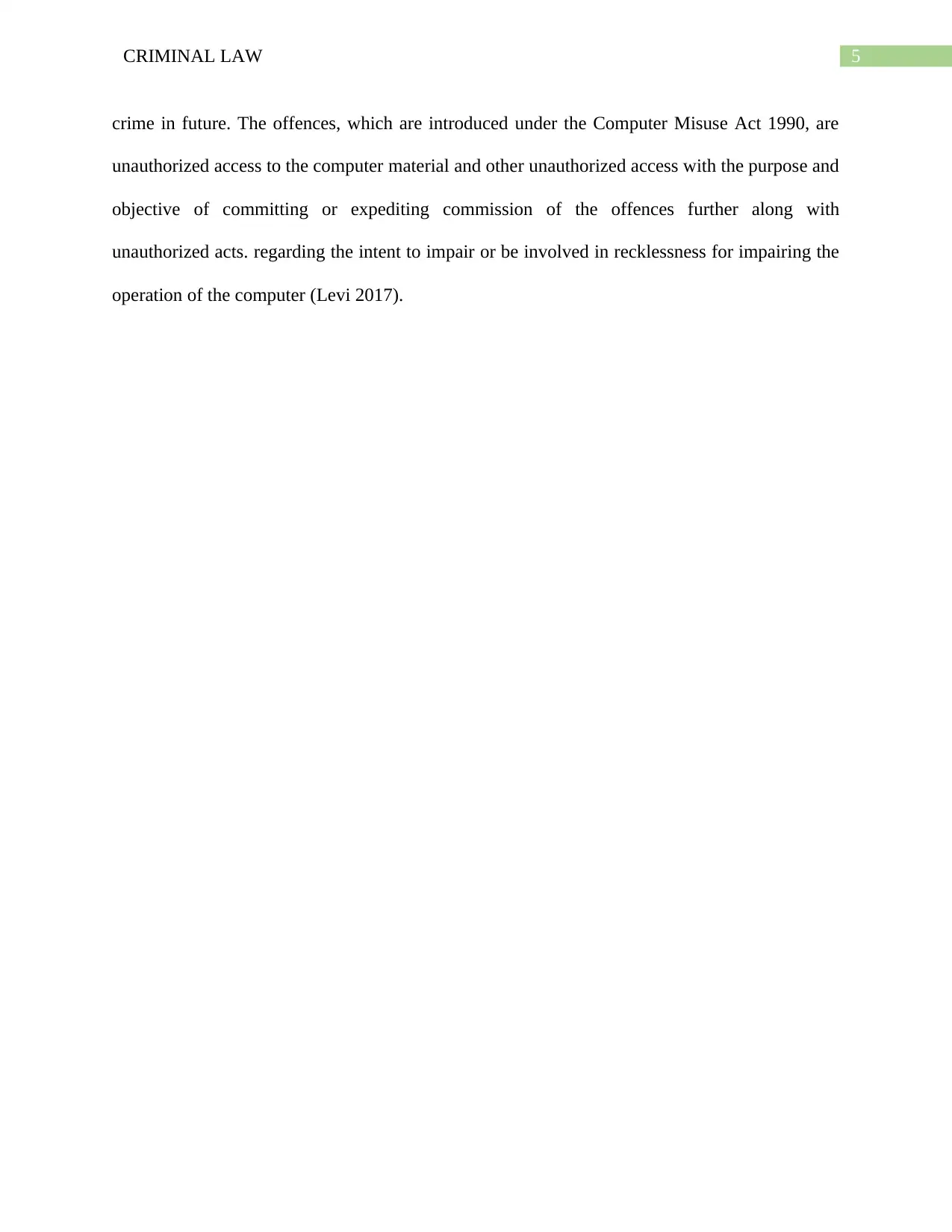
5CRIMINAL LAW
crime in future. The offences, which are introduced under the Computer Misuse Act 1990, are
unauthorized access to the computer material and other unauthorized access with the purpose and
objective of committing or expediting commission of the offences further along with
unauthorized acts. regarding the intent to impair or be involved in recklessness for impairing the
operation of the computer (Levi 2017).
crime in future. The offences, which are introduced under the Computer Misuse Act 1990, are
unauthorized access to the computer material and other unauthorized access with the purpose and
objective of committing or expediting commission of the offences further along with
unauthorized acts. regarding the intent to impair or be involved in recklessness for impairing the
operation of the computer (Levi 2017).
⊘ This is a preview!⊘
Do you want full access?
Subscribe today to unlock all pages.

Trusted by 1+ million students worldwide
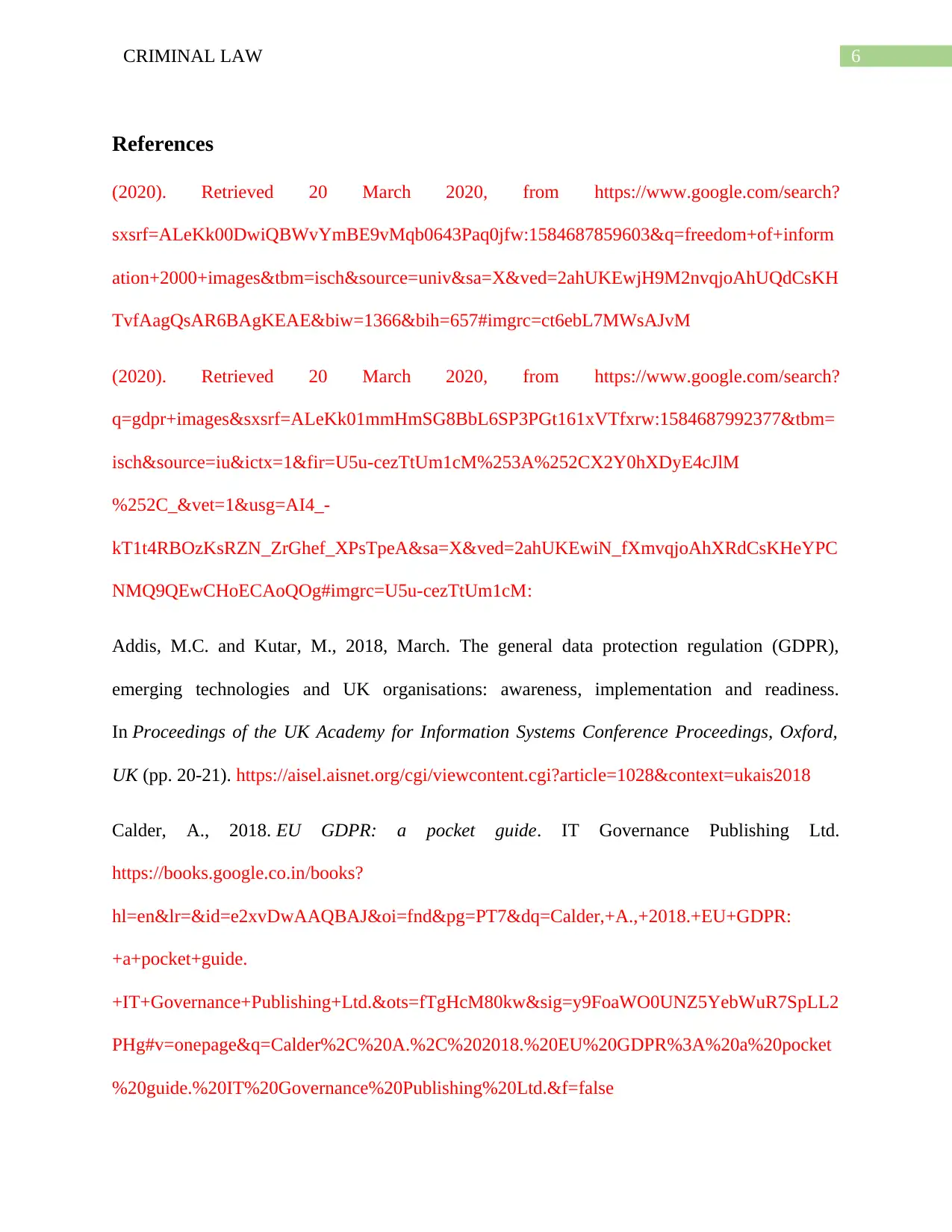
6CRIMINAL LAW
References
(2020). Retrieved 20 March 2020, from https://www.google.com/search?
sxsrf=ALeKk00DwiQBWvYmBE9vMqb0643Paq0jfw:1584687859603&q=freedom+of+inform
ation+2000+images&tbm=isch&source=univ&sa=X&ved=2ahUKEwjH9M2nvqjoAhUQdCsKH
TvfAagQsAR6BAgKEAE&biw=1366&bih=657#imgrc=ct6ebL7MWsAJvM
(2020). Retrieved 20 March 2020, from https://www.google.com/search?
q=gdpr+images&sxsrf=ALeKk01mmHmSG8BbL6SP3PGt161xVTfxrw:1584687992377&tbm=
isch&source=iu&ictx=1&fir=U5u-cezTtUm1cM%253A%252CX2Y0hXDyE4cJlM
%252C_&vet=1&usg=AI4_-
kT1t4RBOzKsRZN_ZrGhef_XPsTpeA&sa=X&ved=2ahUKEwiN_fXmvqjoAhXRdCsKHeYPC
NMQ9QEwCHoECAoQOg#imgrc=U5u-cezTtUm1cM:
Addis, M.C. and Kutar, M., 2018, March. The general data protection regulation (GDPR),
emerging technologies and UK organisations: awareness, implementation and readiness.
In Proceedings of the UK Academy for Information Systems Conference Proceedings, Oxford,
UK (pp. 20-21). https://aisel.aisnet.org/cgi/viewcontent.cgi?article=1028&context=ukais2018
Calder, A., 2018. EU GDPR: a pocket guide. IT Governance Publishing Ltd.
https://books.google.co.in/books?
hl=en&lr=&id=e2xvDwAAQBAJ&oi=fnd&pg=PT7&dq=Calder,+A.,+2018.+EU+GDPR:
+a+pocket+guide.
+IT+Governance+Publishing+Ltd.&ots=fTgHcM80kw&sig=y9FoaWO0UNZ5YebWuR7SpLL2
PHg#v=onepage&q=Calder%2C%20A.%2C%202018.%20EU%20GDPR%3A%20a%20pocket
%20guide.%20IT%20Governance%20Publishing%20Ltd.&f=false
References
(2020). Retrieved 20 March 2020, from https://www.google.com/search?
sxsrf=ALeKk00DwiQBWvYmBE9vMqb0643Paq0jfw:1584687859603&q=freedom+of+inform
ation+2000+images&tbm=isch&source=univ&sa=X&ved=2ahUKEwjH9M2nvqjoAhUQdCsKH
TvfAagQsAR6BAgKEAE&biw=1366&bih=657#imgrc=ct6ebL7MWsAJvM
(2020). Retrieved 20 March 2020, from https://www.google.com/search?
q=gdpr+images&sxsrf=ALeKk01mmHmSG8BbL6SP3PGt161xVTfxrw:1584687992377&tbm=
isch&source=iu&ictx=1&fir=U5u-cezTtUm1cM%253A%252CX2Y0hXDyE4cJlM
%252C_&vet=1&usg=AI4_-
kT1t4RBOzKsRZN_ZrGhef_XPsTpeA&sa=X&ved=2ahUKEwiN_fXmvqjoAhXRdCsKHeYPC
NMQ9QEwCHoECAoQOg#imgrc=U5u-cezTtUm1cM:
Addis, M.C. and Kutar, M., 2018, March. The general data protection regulation (GDPR),
emerging technologies and UK organisations: awareness, implementation and readiness.
In Proceedings of the UK Academy for Information Systems Conference Proceedings, Oxford,
UK (pp. 20-21). https://aisel.aisnet.org/cgi/viewcontent.cgi?article=1028&context=ukais2018
Calder, A., 2018. EU GDPR: a pocket guide. IT Governance Publishing Ltd.
https://books.google.co.in/books?
hl=en&lr=&id=e2xvDwAAQBAJ&oi=fnd&pg=PT7&dq=Calder,+A.,+2018.+EU+GDPR:
+a+pocket+guide.
+IT+Governance+Publishing+Ltd.&ots=fTgHcM80kw&sig=y9FoaWO0UNZ5YebWuR7SpLL2
PHg#v=onepage&q=Calder%2C%20A.%2C%202018.%20EU%20GDPR%3A%20a%20pocket
%20guide.%20IT%20Governance%20Publishing%20Ltd.&f=false
Paraphrase This Document
Need a fresh take? Get an instant paraphrase of this document with our AI Paraphraser
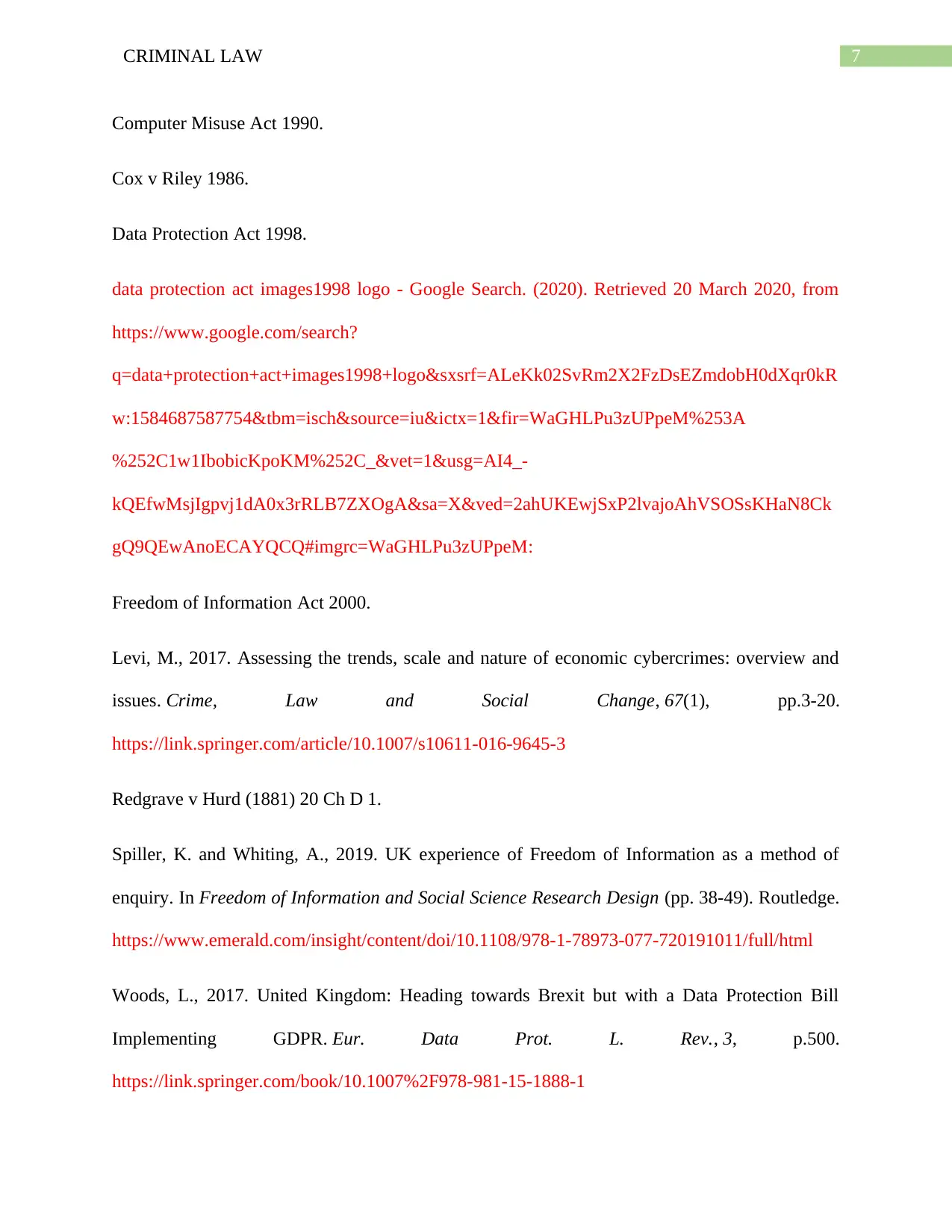
7CRIMINAL LAW
Computer Misuse Act 1990.
Cox v Riley 1986.
Data Protection Act 1998.
data protection act images1998 logo - Google Search. (2020). Retrieved 20 March 2020, from
https://www.google.com/search?
q=data+protection+act+images1998+logo&sxsrf=ALeKk02SvRm2X2FzDsEZmdobH0dXqr0kR
w:1584687587754&tbm=isch&source=iu&ictx=1&fir=WaGHLPu3zUPpeM%253A
%252C1w1IbobicKpoKM%252C_&vet=1&usg=AI4_-
kQEfwMsjIgpvj1dA0x3rRLB7ZXOgA&sa=X&ved=2ahUKEwjSxP2lvajoAhVSOSsKHaN8Ck
gQ9QEwAnoECAYQCQ#imgrc=WaGHLPu3zUPpeM:
Freedom of Information Act 2000.
Levi, M., 2017. Assessing the trends, scale and nature of economic cybercrimes: overview and
issues. Crime, Law and Social Change, 67(1), pp.3-20.
https://link.springer.com/article/10.1007/s10611-016-9645-3
Redgrave v Hurd (1881) 20 Ch D 1.
Spiller, K. and Whiting, A., 2019. UK experience of Freedom of Information as a method of
enquiry. In Freedom of Information and Social Science Research Design (pp. 38-49). Routledge.
https://www.emerald.com/insight/content/doi/10.1108/978-1-78973-077-720191011/full/html
Woods, L., 2017. United Kingdom: Heading towards Brexit but with a Data Protection Bill
Implementing GDPR. Eur. Data Prot. L. Rev., 3, p.500.
https://link.springer.com/book/10.1007%2F978-981-15-1888-1
Computer Misuse Act 1990.
Cox v Riley 1986.
Data Protection Act 1998.
data protection act images1998 logo - Google Search. (2020). Retrieved 20 March 2020, from
https://www.google.com/search?
q=data+protection+act+images1998+logo&sxsrf=ALeKk02SvRm2X2FzDsEZmdobH0dXqr0kR
w:1584687587754&tbm=isch&source=iu&ictx=1&fir=WaGHLPu3zUPpeM%253A
%252C1w1IbobicKpoKM%252C_&vet=1&usg=AI4_-
kQEfwMsjIgpvj1dA0x3rRLB7ZXOgA&sa=X&ved=2ahUKEwjSxP2lvajoAhVSOSsKHaN8Ck
gQ9QEwAnoECAYQCQ#imgrc=WaGHLPu3zUPpeM:
Freedom of Information Act 2000.
Levi, M., 2017. Assessing the trends, scale and nature of economic cybercrimes: overview and
issues. Crime, Law and Social Change, 67(1), pp.3-20.
https://link.springer.com/article/10.1007/s10611-016-9645-3
Redgrave v Hurd (1881) 20 Ch D 1.
Spiller, K. and Whiting, A., 2019. UK experience of Freedom of Information as a method of
enquiry. In Freedom of Information and Social Science Research Design (pp. 38-49). Routledge.
https://www.emerald.com/insight/content/doi/10.1108/978-1-78973-077-720191011/full/html
Woods, L., 2017. United Kingdom: Heading towards Brexit but with a Data Protection Bill
Implementing GDPR. Eur. Data Prot. L. Rev., 3, p.500.
https://link.springer.com/book/10.1007%2F978-981-15-1888-1

8CRIMINAL LAW
⊘ This is a preview!⊘
Do you want full access?
Subscribe today to unlock all pages.

Trusted by 1+ million students worldwide
1 out of 9
Related Documents
Your All-in-One AI-Powered Toolkit for Academic Success.
+13062052269
info@desklib.com
Available 24*7 on WhatsApp / Email
![[object Object]](/_next/static/media/star-bottom.7253800d.svg)
Unlock your academic potential
Copyright © 2020–2025 A2Z Services. All Rights Reserved. Developed and managed by ZUCOL.





